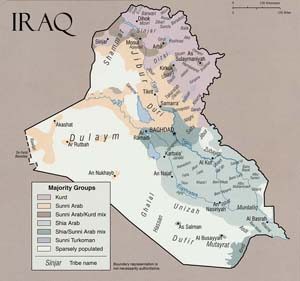Key provinces in Iraq provincial elections 2009
 Baghdad - A selection of key provinces in the Iraqi provincial council elections, due to take place on January 31.
Baghdad - A selection of key provinces in the Iraqi provincial council elections, due to take place on January 31.
Baghdad The capital of Iraq and a city of some 6.5 million people, Baghdad has been the focus of the five-year war, and scene of some of the worst sectarian atrocities. Its demographic make-up has shifted as a result. Ongoing security worries threaten to tarnish the vote. The key contest will be between candidates aligned with Sunni tribal councils, and the Iraqi Islamic Party, which is currently in government, especially in the city's western suburbs.
Salah al-Din Forty-five political entities - parties and coalitions, with more than 600 candidates - are competing for the 28 seats on Salah al-Din's provincial council. The province of some 1 million has been governed since 2005 by Kurdish parties, despite having a majority Sunni Arab population, as Arabs boycotted the 2005 poll. But with Sunni Arabs now expected to take part in the vote, Kurdish parties stand to lose out. Salah al-Din contains the city of Tikrit - Saddam Hussein's home town.
Anbar Because of Anbar's one-time status as the hub of the Iraqi insurgency, the province will be closely watched as a barometer of the country's fledgling democracy. Anbar security forces took over from the US in 2008, and fierce campaigning between tribal council affiliates and the incumbent Iraqi Islamic Party is underway. The IIP have been accused of mismanagement and corruption, a charge which they hotly deny. The government party has also managed to secure an alliance in the province with Sheikh Ahmed Abu Risha, an important tribal leader.
Basra The southern province of Basra, with its three million inhabitants is facing its first electoral test since the March 2008 "Battle of Basra," in which government security forces managed to clear the streets of the Mahdi Army, the militia loyal to the cleric Muqtada al-Sadr. Competition between Shiite parties in the majority Shiite province is the key contest, and questions of the province's position in a federal Iraq, corruption and the influence of Iran are becoming the election's fault-lines.
Karbala Karbala, home to the Imam Hussein Shrine and considered one of Shia Islam's holiest places, could witness a split between the two main parties in federal government - the prime minister's Daawa party and Abdul Aziz al-Hakim's Supreme Islamic Iraqi Council. Al-Hakim's party is appearing to challenge the consolidation of Prime Minister al-Maliki's power, and in particular his fostering of tribal councils in the area. In response, al-Hakim's party has appeared to claim the support of Ayatollah Ali al-Sistani, the country's highest Shiite authority - in direct contravention of election rules.
Nineveh Violence in Nineveh province has persisted even as other parts of the country have appeared calm as a result of 2007's "surge" strategy. In particular, al-Qaeda elements are believed to have relocated to the region, and Christian and other minorities have suffered a spate of sectarian attacks in the past months. In the capital Mosul, the population is reportedly fearful of voting, which could limit the mandate of the two main blocs - the pan-Arab National Hadba list, and the mainly-Kurdish Nineveh Brotherly List. (dpa)